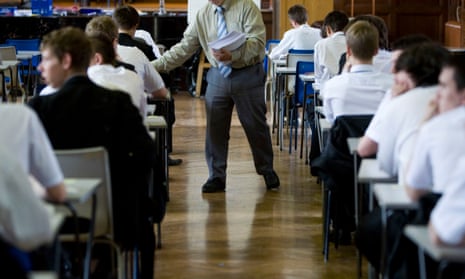Schools are being urged to focus improvement efforts on struggling white working-class pupils who get the worst GCSE results of all the main ethnic groups, amid growing concern about stark disparities in attainment.
A study by the Sutton Trust education charity found that disadvantaged pupils from Chinese backgrounds were almost three times as likely to get the benchmark five good GCSEs as their white working-class peers.
While poverty continues to play a major role in educational outcomes, attainment among pupils from Bangladeshi, black African and Chinese backgrounds who are on free school meals (FSM) has improved dramatically in the past decade.
Among poorer white children, meanwhile, just a quarter of boys (24%) and a third of girls (32%) achieve the benchmark of five good GCSEs, leading to calls for schools to target those pupils at risk of falling behind.
Attainment at GCSE among disadvantaged pupils from Bangladeshi, black African and Chinese pupils has improved by more than 20 percentage points since 2006, while the national average has improved by 13.5 percentage points. Performance among white working-class children over the same period has remained stubbornly low.
“Several explanations have been proposed for this shift,” says the report. “The popularity of private tutors among ethnic groups and the latter’s concentration in large urban areas such as London (where average results have improved in recent years, with some suggesting that ethnic minorities have driven this progress), the impact of supplementary schools, and differing levels of parental aspiration, among others.”
Sir Peter Lampl, chairman of the Sutton Trust, welcomed improving attainment among some ethnic groups. “This may reflect a strong cultural appreciation of education from which we can all learn,” he said.
“But it is worrying that there is such a disparity in the achievement of different ethnic groups at GCSE and particularly concerning that white working-class boys and girls continue to perform so poorly.
“Harnessing that same will to learn that we see in many ethnic minority groups in white working-class communities should be a part of the solution to the low attainment of many boys and girls. We need a more concerted effort with white working-class boys, in particular.”
Beyond school, the paper – entitled Class Differences and published on Thursday – reports that 45% of white British pupils attend university, the lowest rate of all ethnicities excluding Gypsy/Roma. Yet white British students have better rates of attending elite universities, with 24% of those who go on to higher education attending a Russell Group university, more than most minority ethnic groups.
The Sutton Trust is calling for targeted improvement programmes aimed at pupils at particular risk of falling behind, including white working-class children. It is also urging the government to introduce incentives to attract the best teachers into the most deprived schools; “enrichment vouchers” for disadvantaged ethnic groups to provide opportunities to supplement core lessons; and a dedicated fund to support highly able pupils from less advantaged backgrounds who fall behind.
Meanwhile, the Social Market Foundation has published a report arguing that the government should fund after-school family literacy classes in primary schools, to tackle inequality by helping parents take a more active role in their children’s education.
The report from the thinktank’s bipartisan commission on inequality in education, led by the former deputy prime minister Nick Clegg, found that children with parents who regularly read to them, helped with homework and attended parent-teacher meetings made much faster progress and had better attainment.
The commission also suggested independent schools and universities could be encouraged to open their facilities and activities to parents, as part of the government’s latest proposals on school improvement and higher education access agreements.
Children who listened to or played music outside of school also made better progress at school, the report noted, as well as those who took part in cultural and social activities such as art.
“This research clearly highlights the benefits of parents and carers’ increased engagement with their children’s education,” Clegg said. “The government should work closely with Ofsted and primary schools to create more opportunities for parents to be involved in after-school activities. This is a low cost, simple solution that could significantly improve outcomes for many children.”
